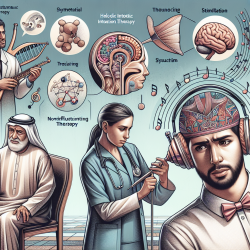Introduction
In the ever-evolving field of dementia care, the need for innovative and collaborative approaches is paramount. The Wisconsin Alzheimer's Institute Dementia Diagnostic Clinic Network (WAI-DDCN) offers a model of excellence through its community of practice. This initiative, as detailed in the research by Mora Pinzon et al., provides a framework for improving dementia care by fostering interprofessional collaboration and continuous education among healthcare providers. This blog explores how practitioners can enhance their skills and improve patient outcomes by leveraging the insights from this groundbreaking research.
The Power of Communities of Practice
Communities of practice (CoPs) are groups of people who share a concern or passion for something they do and learn how to do it better through regular interaction. The WAI-DDCN exemplifies this concept by bringing together 38 clinics across 26 healthcare systems in Wisconsin. This network facilitates the exchange of best practices and innovative approaches in dementia care, ultimately leading to enhanced patient outcomes.
According to the study, CoPs offer several advantages, including:
- Shared best practices and educational resources
- Continuing education opportunities for healthcare providers
- Continuous quality improvement of clinical practices
- Adoption of new diagnostic and management approaches
Implementing Evidence-Based Strategies
One of the key takeaways from the WAI-DDCN study is the importance of implementing evidence-based strategies in dementia care. The network emphasizes the use of data-driven decisions to improve diagnostic accuracy and patient management. Practitioners are encouraged to participate in educational events and workshops that focus on the latest research and innovations in the field.
By engaging in these learning opportunities, practitioners can:
- Enhance their knowledge and skills in dementia diagnosis and management
- Stay updated on the latest advancements in dementia care
- Improve their ability to provide high-quality care to patients with dementia
Encouraging Further Research
The study also highlights the importance of ongoing research in dementia care. Practitioners are encouraged to contribute to the body of knowledge by conducting their own research or collaborating with academic institutions. This not only advances the field but also provides valuable insights that can be applied in clinical practice.
Practitioners can get involved in research by:
- Participating in clinical trials and studies
- Collaborating with research institutions and academic partners
- Sharing their findings and experiences with the broader healthcare community
Conclusion
The WAI-DDCN serves as a model for improving dementia care through collaboration, education, and research. By embracing the principles of communities of practice, practitioners can enhance their skills, adopt evidence-based strategies, and contribute to the advancement of dementia care. As healthcare providers, it is our responsibility to continually seek out opportunities for learning and growth to provide the best possible care for our patients.
To read the original research paper, please follow this link: The Wisconsin Alzheimer's Institute Dementia Diagnostic Clinic Network: A community of practice to improve dementia care.










